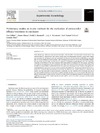Identificador persistente para citar o vincular este elemento:
https://accedacris.ulpgc.es/jspui/handle/10553/69901
| Título: | Preliminary studies on in vitro methods for the evaluation of anticoccidial efficacy/resistance in ruminants | Autores/as: | Odden, Ane Stuen, Snorre Enemark, Heidi L. Robertson, Lucy J. Molina Caballero, José Manuel Ruiz Reyes, Antonio |
Clasificación UNESCO: | 310907 Patología 320505 Enfermedades infecciosas |
Palabras clave: | Anticoccidial Resistance Bovine Colonic Epithelial Cells Eimeria Spp. In Vitro Assay |
Fecha de publicación: | 2019 | Publicación seriada: | Experimental parasitology | Resumen: | Ovine Eimeria spp. infections cause increased mortality, reduced welfare and substantial economic losses, and anticocccidials are important for their control. Recent reports of anticoccidial resistance against ovine Eimeria spp. necessitate the development of in vitro methods for the detection of reduced anticoccidial efficacy, especially since the in vivo methods are both expensive, time consuming and requires the use of otherwise healthy animals. The aim of the present study was therefore to approach a preliminary standardization of in vitro assays for evaluation of the efficacy of the most commonly used anticoccidials in ruminants. For this purpose, apart from the evaluation of inhibition of oocyst sporulation, most effort was concentrated on assessment of the capacity of the different anticoccidials to inhibit both the invasion and further development (up to the first schizogony)of E. ninakohlyakimovae sporozoites in bovine colonic epithelial cells (BCEC). For this purpose, infected cultures were monitored 1, 8 and 15 days post infection to determine the infection rate, number of immature schizonts and number, size and appearance of mature schizonts, respectively. No clear inhibitory effect was found with any of the anticoccidial formulations tested, and we could not identify why there were no measurable effects from the different anticoccidials. Despite the lack of positive results, further investigations should be encouraged, as this could decrease the need for animal experiments and could be used in the initial assessment of anticoccidial efficacy of new drugs. | URI: | https://accedacris.ulpgc.es/handle/10553/69901 | ISSN: | 0014-4894 | DOI: | 10.1016/j.exppara.2019.04.009 | Fuente: | Experimental Parasitology [ISSN 0014-4894], v. 201, p. 34-41 |
| Colección: | Artículos |
Citas SCOPUSTM
10
actualizado el 08-jun-2025
Citas de WEB OF SCIENCETM
Citations
10
actualizado el 22-feb-2026
Visitas
51
actualizado el 10-ene-2026
Descargas
83
actualizado el 10-ene-2026
Google ScholarTM
Verifica
Altmetric
Comparte
Exporta metadatos
Los elementos en ULPGC accedaCRIS están protegidos por derechos de autor con todos los derechos reservados, a menos que se indique lo contrario.
